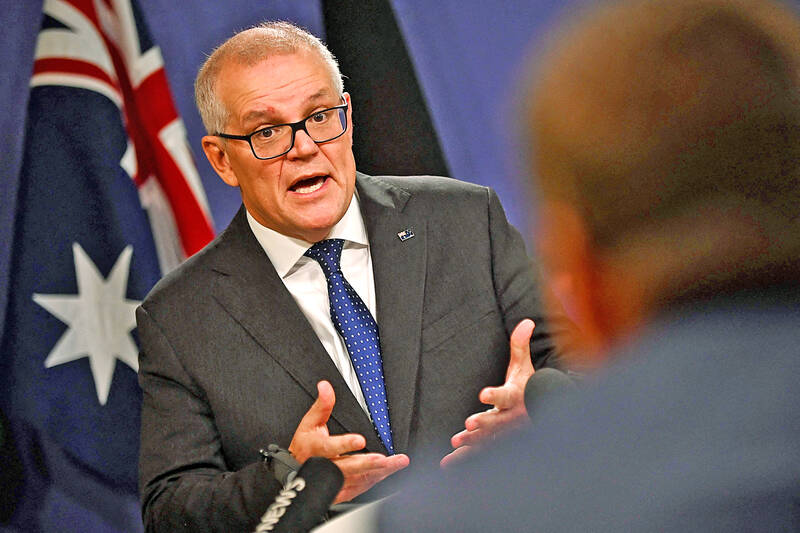Former Australian prime minister Scott Morrison told The Australian newspaper that he intends to visit Taiwan next month.
The news came after a delegation of Australian parliamentarians this week traveled to Taipei, provoked a strong reaction from China, with Chinese Ambassador to Australia Xiao Qian (肖千) saying visits to Taiwan by Australian politicians sent the wrong message.
“Australian members of parliament or the former prime minister are both political figures,” Xiao said on the sidelines of an event honoring the 74th anniversary of the founding of the People’s Republic of China. “Visiting Taiwan carries an obvious political meaning, and is a wrong signal sent to Taiwan independence forces.”

Photo: AFP
Morrison, a strident critic of the Chinese government, said in response to Xiao’s comments that Beijing had no right to tell Australian lawmakers where they could and could not travel.
“The Chinese government in Beijing does not get to decide whether Australian members of parliament can visit Taiwan or not, nor do they get to tell Australians or the world what Australia’s ‘one China’ policy means,” he told The Australian.
Separately, Paul Fletcher, a member of the Australian House of Representatives who was also a member of the delegation that visited Taiwan this week, said on Wednesday that the bipartisan group is sending an important signal about the importance of the Taiwan-Australia relationship.
Fletcher said the delegation is made up of eight parliamentarians from the lower and upper houses.
“Very importantly, it [the delegation] has members from both of our major political parties, the Liberal Party, which I’m a member of, and the Labor Party, which is presently in government in Australia,” he said.
That both major parties are represented in the visiting group is an important signal as to the value of the relationship between Australia and Taiwan, Fletcher said.
The delegation’s visit followed one by a bipartisan delegation of Australian parliamentarians in December last year, the first such visit since the onset of the COVID-19 pandemic.
This week’s visit also comes at a sensitive time as Australia endeavors to mend strained relations with Beijing, a situation that originated from the country’s request for an inquiry into the origins of COVID-19. In response, China imposed trade restrictions on some Australian goods in 2020, but started to soften its stance following a change of government in Canberra last year.
The decision to travel to Taiwan has been influenced by a number of factors, including a number of constituents who are of Taiwanese origin, Fletcher said.
The factors also include his own background as former Australian minister for communications and his current role as the Shadow Minister for Science and the Arts and for Government Services and the Digital Economy.
This is particularly relevant given the developments in semiconductors and computers in Taiwan, he said.
During their four-day visit, the group met with President Tsai Ing-wen (蔡英文) and other senior officials and discussed topics including Indo-Pacific affairs, and digital and information security, the Ministry of Foreign Affairs said.

The Ministry of Education (MOE) is to launch a new program to encourage international students to stay in Taiwan and explore job opportunities here after graduation, Deputy Minister of Education Yeh Ping-cheng (葉丙成) said on Friday. The government would provide full scholarships for international students to further their studies for two years in Taiwan, so those who want to pursue a master’s degree can consider applying for the program, he said. The fields included are science, technology, engineering, mathematics, semiconductors and finance, Yeh added. The program, called “Intense 2+2,” would also assist international students who completed the two years of further studies in

The brilliant blue waters, thick foliage and bucolic atmosphere on this seemingly idyllic archipelago deep in the Pacific Ocean belie the key role it now plays in a titanic geopolitical struggle. Palau is again on the front line as China, and the US and its allies prepare their forces in an intensifying contest for control over the Asia-Pacific region. The democratic nation of just 17,000 people hosts US-controlled airstrips and soon-to-be-completed radar installations that the US military describes as “critical” to monitoring vast swathes of water and airspace. It is also a key piece of the second island chain, a string of

Former president Tsai Ing-wen (蔡英文) departed for Europe on Friday night, with planned stops in Lithuania and Denmark. Tsai arrived at Taiwan Taoyuan International Airport on Friday night, but did not speak to reporters before departing. Tsai wrote on social media later that the purpose of the trip was to reaffirm the commitment of Taiwanese to working with democratic allies to promote regional security and stability, upholding freedom and democracy, and defending their homeland. She also expressed hope that through joint efforts, Taiwan and Europe would continue to be partners building up economic resilience on the global stage. The former president was to first

Taiwan will now have four additional national holidays after the Legislative Yuan passed an amendment today, which also made Labor Day a national holiday for all sectors. The Chinese Nationalist Party (KMT) and Taiwan People’s Party (TPP) used their majority in the Legislative Yuan to pass the amendment to the Act on Implementing Memorial Days and State Holidays (紀念日及節日實施辦法), which the parties jointly proposed, in its third and final reading today. The legislature passed the bill to amend the act, which is currently enforced administratively, raising it to the legal level. The new legislation recognizes Confucius’ birthday on Sept. 28, the